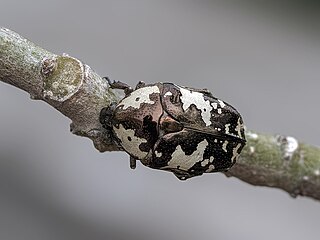Pratylenchus brachyurus is a plant parasitic nematode.

Anguina is a genus of plant pathogenic nematodes.
Androdioecy is a reproductive system characterized by the coexistence of males and hermaphrodites. Androdioecy is rare in comparison with the other major reproductive systems: dioecy, gynodioecy and hermaphroditism. In animals, androdioecy has been considered a stepping stone in the transition from dioecy to hermaphroditism, and vice versa.

The nematodes, roundworms or eelworms constitute the phylum Nematoda. They are a diverse animal phylum inhabiting a broad range of environments. Most species are free-living, feeding on microorganisms, but many species are parasitic. The parasitic worms (helminths) are the cause of soil-transmitted helminthiases.

Mermithidae is a family of nematode worms that are endoparasites in arthropods. As early as 1877, Mermithidae was listed as one of nine subdivisions of the Nematoidea. Mermithidae are confused with the horsehair worms of the phylum Nematomorpha that have a similar life history and appearance.
Mohammad Shamim Jairajpuri was an Indian zoologist. He served as a professor and Chairman of the Zoology Department and Dean of the Faculty of Life Sciences at Aligarh Muslim University Aligarh before retirement in 2004. He received the first Janaki Ammal National Award bestowed by the Government of India, Ministry of Environment & Forests and Lifetime Achievement Award from the Zoological Society of India for his notable works on taxonomy of nematodes (1964–2004).
Michel Luc was a French zoologist (nematologist) and one of the founding fathers of the field of plant-nematology. He spent his career with ORSTOM, now IRD. He created the first French nematology laboratory in the ORSTOM research station of Adiopodoumé, near Abidjan in 1955, and a second nematology lab at Dakar Bel-Air (Senegal) in 1969. In 1978, he launched the Revue de Nématologie that fused with Nematologica in 1999 to become Nematology, currently the leading nematology journal in the field. He was a world-renowned authority on nematode taxonomy.

Phasmarhabditis hermaphrodita is a facultative parasitic nematode that can kill slugs and snails. It belongs to the family Rhabditidae, the same family as Caenorhabditis elegans.
Micoletzkya is a genus of predatory bark-beetle-associated nematodes in the family Diplogastridae. The genus was named for the Austrian nematologist Heinrich Micoletzky. As of 2013 it consists of 25 described species.

Diplogastridae, formerly Diplogasteridae, are a family of nematodes (roundworms) known from a wide range of habitats, often in commensal or parasitic associations with insects.
Pristionchus maxplancki is a species of diplogastrid nematodes (roundworms).
Trichodoridae is a family of terrestrial root feeding nematodes, being one of two that constitute suborder Triplonchida. They are economically important plant parasites and virus vectors.

Diana Harrison Wall was an American environmental scientist and soil ecologist. She was the founding director of the School of Global Environmental Sustainability, a distinguished biology professor, and senior research scientist at the Natural Resource Ecology Laboratory at Colorado State University. Wall investigated ecosystem processes, soil biodiversity and ecosystem services. Her research focused on the Antarctic McMurdo Dry Valleys and its Wall Valley was named after her. Wall was a globally recognized leader and speaker on life in Antarctica and climate change.
Caenorhabditis tropicalis is a species of Caenorhabditis nematodes, belonging to the Elegans super-group and Elegans group within the genus. It is a close relative of C. wallacei.C. tropicalis is collected frequently in tropical South America, Caribbean islands, and various islands in the Indian and Pacific Oceans from rotting fruit, flowers and stems. C. tropicalis was referred to as "C. sp. 11" prior to 2014.
Myolaimidae is a family of nematodes in the order Rhabditida. It consists of two genera, Myolaimus and Deleyia.

Protaetia aurichalcea is a species of flower-chafer beetle in the family Scarabaeidae. It is found in Asia.
The Russian Journal of Nematology is a peer-reviewed scientific journal covering all aspects of studying nematodes. It was established in 1993 and is published by the Russian Society of Nematologists. The editors-in-chief are Roland Perry Sergei Subbotin and Sergei Spiridonov.
István Andrássy was a Hungarian nematologist. Starting with his first publication in 1952 on the nematode fauna of Mount Bükk, over his dissertation in 1973 on the evolution of nematodes to his last days he was a very prolific scientist, publishing more than 200 manuscripts, chapters and books on the class of Nematoda. He described 530 taxa of nematodes and at least 60 nematode taxa are named after him, which shows the huge respect he had in the nematologists world.

Warwick Llewellyn Nicholas (1926–2010) was an Australian zoologist known as a pioneer in the field of nematology. He was a foundational member of the Australian Society for Parasitology (ASP) and in 1964, he organised the first ASP meeting. He became President of the Society in 1978, before being an elected Fellow from 1979.
May Belle Hutson Chitwood was an American author, nematologist, helminthologist, and zoologist at the Agricultural Research Service, curator of the National Parasite Collection, and director of the primate parasite registry at University of California at Davis. Chitwood specialized in the morphology of nematodes early in the research of this aspect of the species, and was considered a world authority. She published over 50 research papers about nematology, helminthology, and zoology.







